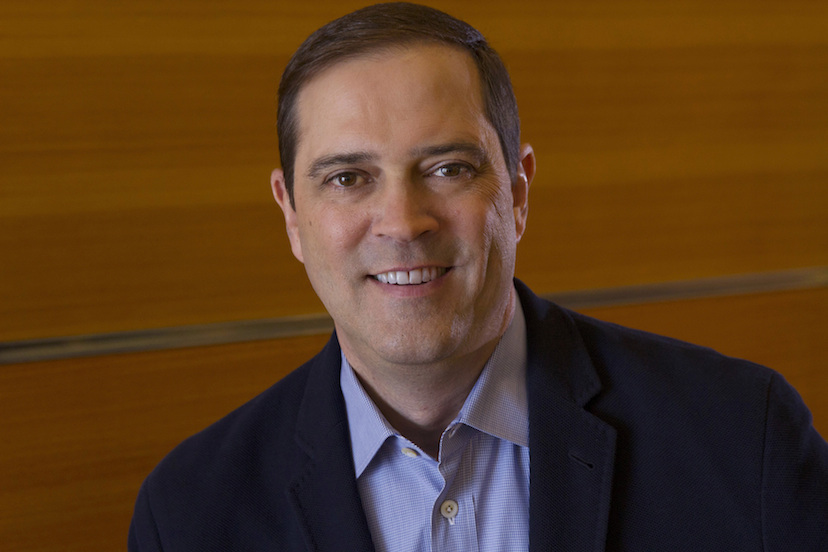 INFRA
INFRA
 INFRA
INFRA
 INFRA
INFRA
Still contending with a difficult transition from its core networking hardware to software and security services, Cisco Systems Inc. today reported slightly better-than-expected profits on nearly flat revenues but forecasted lower earnings in the current quarter.
The maker of networking gear and software earned a profit for the first quarter of its fiscal 2017 of 61 cents a share, not including some costs such as stock compensation, up 3 percent from a year ago. Revenues fell 3 percent, to $12.4 billion, but minus the set-top box business Cisco sold in 2015, they rose 1 percent.
That slightly outpaced analysts’ forecasts of a 59-cent profit, flat from a year ago, on $12.34 billion in revenues. But Chief Executive Chuck Robbins (above) said during the earnings conference call that overall orders fell 2 percent thanks to a bigger-than-expected 12 percent drop in orders from telecommunications service providers.
Cisco also said it expects fiscal second-quarter revenues to decline between 2 and 4 percent from a year earlier, not including the set-top box business, with adjusted earnings of 55 to 57 cents a share.
Investors weren’t thrilled with the outlook, as shares fell more than 4 percent in immediate after-hours trading. They were down a fraction of 1 percent in regular trading today. Shares are up about 20 percent from a year ago. Update: Shares were falling 5.5 percent in Thursday trading.
“We delivered a strong Q1 in an environment that continues to be challenging,” Robbins said in comments during the call. He also said the company’s “innovation pipeline is robust and we are well positioned for the future.” In particular, he highlighted “rapid adoption of cloud-managed networking” stemming from its Meraki acquisition in 2012.
But Robbins also said the reason for the down outlook for revenues was mainly because of the large decline in revenues from service providers, which constitutes a quarter of Cisco’s revenues, implying those declines would continue. Part of the reason for that could be an uncertain regulatory environment both in the U.S. and abroad.
“We saw a large number of customers around the world that just put the brakes on,” he said.
The results indicate that Cisco’s strategy of moving beyond its mainstay network switching and routing equipment, which are gradually declining, into the networking software and security services customers increasingly are moving their data centers to, are slowly moving ahead, but perhaps not fast enough for investors. Like other data center hardware companies, from Hewlett-Packard Enterprise Co. to Dell Technologies, Cisco has been playing catch-up with so-called software-defined networks.
“It’s getting eroded by new vendors who found profitable niches where they can beat Cisco,” Forrester Research Inc. analyst Glenn O’Donnell said. “Cisco is making a hard push on software, a very painful switch from the Cisco of yore. All of it bodes well for the future Cisco, but there will be some tough times during this change.”
A Cisco rival, the software-defined wide area network startup CloudGenix Inc., said the networking giant’s own software-defined business isn’t growing nearly as fast as the overall market, which is growing about 90 percent a year. “They’re seeing a small amount of that growth,” said CloudGenix founder and CEO Kumar Ramachandran.
Security revenues rose the most, by 11 percent, followed by NGN (for next-generation networking) Routing at 6 percent. Switching revenues fell 7 percent, Collaboration and Data Center unit revenues each declined 3 percent, and revenues in Wireless and Service Provider Video each were down 2 percent.
In its fourth quarter, Cisco had announced the layoffs of up to 5,500 employees, or 7 percent of its workforce, as it struggles to make the transition toward software.
In response to questions about the seemingly conservative outlook, Robbins cited the uncertain political and regulatory environment in U.S. and worldwide. As for the recent election of Donald Trump, he said, “Most CEOs I talk to are pragmatic about the results. President-elect Trump seems to be very business-oriented and seems to be committed to growing the economy.” He said that would be good for business in general.
Also encouraging, said Chief Financial Officer Kelly Kramer, is Trump’s vow to ease taxes on tens of billions of dollars in cash that companies such as Cisco, Intel Corp. and Apple Inc. hold outside the U.S. and want to “repatriate” to use here. “It’ll certainly give us a lot more flexibility,” she said, to reduce debt, buy back shares and do more acquisitions.
Support our mission to keep content open and free by engaging with theCUBE community. Join theCUBE’s Alumni Trust Network, where technology leaders connect, share intelligence and create opportunities.
Founded by tech visionaries John Furrier and Dave Vellante, SiliconANGLE Media has built a dynamic ecosystem of industry-leading digital media brands that reach 15+ million elite tech professionals. Our new proprietary theCUBE AI Video Cloud is breaking ground in audience interaction, leveraging theCUBEai.com neural network to help technology companies make data-driven decisions and stay at the forefront of industry conversations.